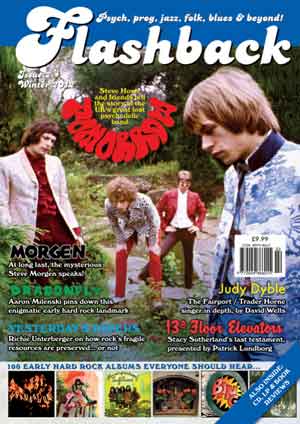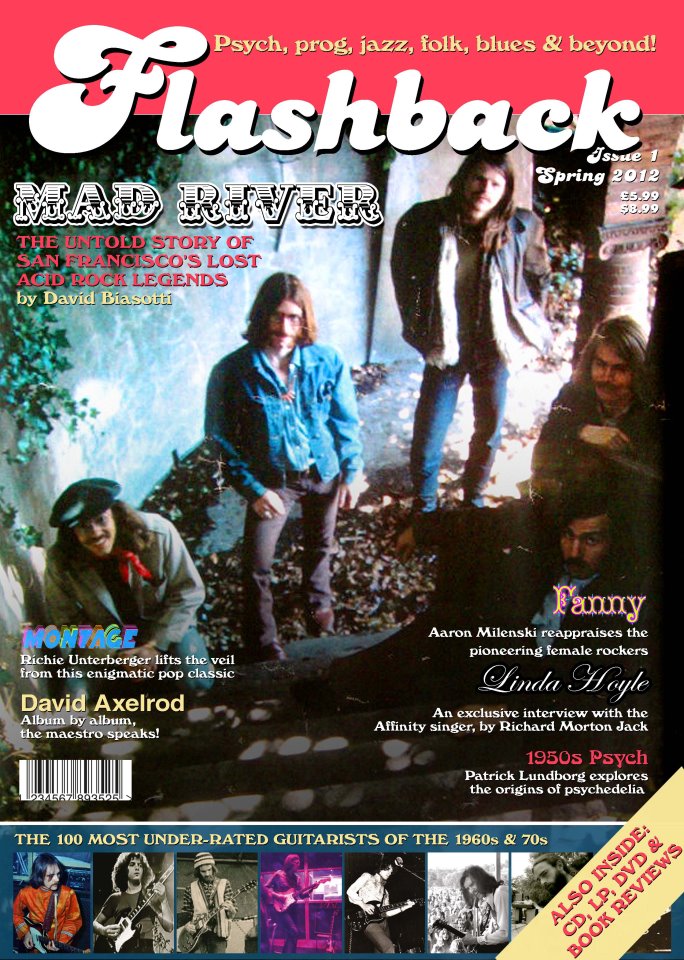Attention Terrascope readers: there’s a new kid in town and he will be of particular interest to fans of ’60s and ’70s “psych, prog, jazz, folk, blues & beyond”, according to the magazine subtitle. The first thing that strikes the reader is the sheer enormity of Flashback: over 200 pages of colour glossy goodness, packed with incredibly detailed interviews, overviews, and reviews of famous and not-so-famous artists from the late ’60s and early ’70s. For issue 2, Editor/publisher Richard Morton Jack (himself a Terrascope alumnus) interviewed every member of cult psych phenom, Tomorrow, resulting in “the fullest piece ever written about them”. He’s also managed to scare up scores of rare illustrative material on the band, making this a dream come true for fans of one of the essential British psych bands.
But there’s much, much more: a revealing interview with Fairport Convention/Trader Horne vocalist, Judy Dyble (who Terrascope readers will no doubt remember as the original vocalist in the prototype King Crimson –cf. The Brondesbury Tapes), an annotated trip (led by the man himself) through legendary guitarist Ray Russell’s solo discography, the transcript of 13th Floor Elevators’ guitarist Stacy Sutherland’s last interview, dozens of book and music reviews, and, in an issue which is particularly devoted to hard rockers, extensive analyses of the work of Morgen, Influence, and Dragonfly. Crimson –cf. The Brondesbury Tapes), an annotated trip (led by the man himself) through legendary guitarist Ray Russell’s solo discography, the transcript of 13th Floor Elevators’ guitarist Stacy Sutherland’s last interview, dozens of book and music reviews, and, in an issue which is particularly devoted to hard rockers, extensive analyses of the work of Morgen, Influence, and Dragonfly.
One of the fun elements in Jack’s two compendiums of British (Galactic Ramble) and US (Endless Trip) music was the listmania tucked away in the back. This issue adds to the fun with a recommendation for the “100 Early Hard Rock Albums Everyone Should Hear”. The fact that yours truly contributed should in no way deter you from joining in the argy-bargy. I’m sure we’ve missed some of your favourites, which, as with the 100 Underrated guitarists list from Issue 1, Jack will no doubt acknowledge come issue 3.
Elsewhere, US music critic/author Richie Unterberger unravels the mystery behind the preservation of historic music journals – the precursors to Flashback and Ptolemaic Terrascope – and offers a 13-part overview of nearly 60 music journals and newspapers that provided invaluable coverage to both major and underground acts between 1963-1975. Where possible, he even tells you how you can get your hands on (at least) online or digitised copies. The issue also focuses on one such magazine, Hullabaloo, with an exclusive interview with its editor, Gerald Rothberg.
Finally, there’s a lengthy interview with Gordon Jackson, who reveals all the details behind his cult solo album, featuring Traffic as his “backing band”! All in all, a worthy successor to the attitude, intelligence, and comprehensiveness of what Ptolemaic Terrascope was all about, particularly our own groundbreaking interviews with little know cult artists from the mid-’60s to the mid-’70s and worthy of your time and investment. (Jeff Penczak)
Jeff Penczak interviewed Flashback editor Richard Morton Jack to get the scoop on what prompted him to dive into the dangerous waters of publishing another music journal and which niche he envisions Flashback filling.
Flashback covers the same era that your British (Galactic Ramble) and US (Endless Trip) compendiums addressed. What was the idea behind Flashback? Was it to explore this music in depth? Did you feel a dearth of information was available to fans of this era’s music?
Having sounded out a few other writers whose opinions and work I respect, I became convinced that there was room for a new music magazine that assumed a certain level of knowledge of its readers, and allowed its stories as much space as they need to get across. I don’t think there’s a dearth of information available to fans of 60s and 70s music, but the mainstream music mags that cover this area tend to focus on a relatively small number of well-known artists, and don’t have an especially rigorous approach. Like all the writers involved, I like the Beatles, the Stones, the Who, the Doors etc every bit as much as the more obscure artists – but they’ve been covered so intensively elsewhere that, unless there’s something new to say about them, Flashback will focus on lesser-known artists. But I hope that doesn’t make it seem elitist – I don’t think you have to have heard of Mad River or Tomorrow to find their stories interesting.
What were some of your influences in preparing Flashback?
Needless to say, the Terrascope is one of the magazines that paved the way for Flashback, and I have the greatest respect for it. Ugly Things springs to mind too. Otherwise, I was more influenced by my frustrations with the shortcomings (as I perceived them) of most modern music mags.
How do you develop your contents for each issue?
I have a list of art ists that I would like to see covered, which I propose to different writers who might be interested. I also receive suggestions from contributors, and decide which to run with on an issue-by-issue basis. Fortunately there’s no shortage of interesting artists that have yet to be written about. There are also regular features (‘Jukebox’, in which current musicians choose 12 tracks that have influenced them, ‘First Person’, in which an interesting individual writes about their experiences during the ‘Flashback era’, a top 100 of one sort or another, and so on). ists that I would like to see covered, which I propose to different writers who might be interested. I also receive suggestions from contributors, and decide which to run with on an issue-by-issue basis. Fortunately there’s no shortage of interesting artists that have yet to be written about. There are also regular features (‘Jukebox’, in which current musicians choose 12 tracks that have influenced them, ‘First Person’, in which an interesting individual writes about their experiences during the ‘Flashback era’, a top 100 of one sort or another, and so on).
I love the lists you come up with – 100 Overlooked Guitarists and 100 Early Hard Rock Classics. Are these the type of conversation-starters you hoped would emerge from the magazine?
Yes! Most music fans like a list, and they’re an easy way to provoke debate, as well as to turn people onto music they might otherwise never have heard of. And, of course, with YouTube to hand, checking out a recommended track has never been easier.
Your interviews are incredibly detailed. Have you had to do a lot of prodding to get your subjects to open up or recall events from 45+ years ago, or are they happy to talk about those halcyon days?
Everyone has been friendly and forthcoming. I think at times they’re surprised by the detail we want to go into, but once they get used to the idea, they appreciate the serious interest we have in their work. For example, Steve Howe has been interviewed hundreds of times, but we ended up discussing aspects of his early work that hadn’t been touched on before, and I hope the result (part of the Tomorrow feature in issue #2) is an important resource for anyone interested in his work.
How do you manage that tightrope wire act of interviewing artists you’re interested in without risking losing potential purchasers by featuring artists that might be too obscure for the casual music fan? And in that respect, how would you define your audience – what demographic are you hoping to reach?
I guess the magazine isn’t really aimed at ‘casual music fans’, because there are plenty of publications that cater to that market, and Flashback is defined by the detail it goes into. Flashback’s readership consists of people who already know the basics about most of the better-known acts of the era, and want to dig deeper. There’s no specific demographic – men and women of all ages have been in touch since the first issue appeared, which is gratifying.
How have you prepared Flashback to succeed in a market where music journals seem to come and go with alarming frequency?
There’s no preparation you can make apart from making it as good as you can, then sitting back and seeing how many people buy it. I’ve tried to include as much archive material as I can (rare old ads, articles and promo material), and to interview people in great depth, so that the magazine can be as authoritative as possible. I’ve also tried to make it as long as it could be, and to print in full colour, so the images can have the impact they deserve. But that’s about all I can do.
How has the response been?
The response has been encouraging, but it’s a very expensive magazine to produce, and it needs to sell a good number of copies to break even. Making people aware of its very existence is the main battle . .
You haven’t included any ‘letters to the editor’ yet. Is that something you might include in future issues so the readers can discover what other fans have enjoyed (or disliked) about the issues? Or are you relying on readers to start (or join) conversations via the Flashback Facebook page?
Most correspondence is carried out on Facebook, as you suggest. I encourage as many people as possible to join the Facebook group and respond to feedback there. Also, I’ve never thought it’s a good idea for magazines to print laudatory letters. I’ll respond to criticism in my editorial each issue. Fortunately there hasn’t been much… yet, anyway.
Have you managed to make issues available on the continent and in other parts of the world outside Britain – is it available on newsstands or is it online ordering for the time being?
Anyone can buy it at the website, but foreign territories are down to individual distributors. It’s a heavy beast, though, so sending small numbers of copies to different countries isn’t viable.
Some of the other nostalgia rock ‘zines include cover CDs. Have you considered something along those lines?
It would be nice, and I have been approached about doing so, but Flashback already involves a lot of work and money, so I think that would break the camel’s back (the camel being me). Also, as I said earlier, it’s very easy to access rare music in this day and age, and I’m not sure I could compile a CD of relevant music that wasn’t already easily obtainable online.
Finally, do you have your agendas established for the foreseeable issues or are you open to suggestions from the adventurous reader who might want to submit something?
I am of course wide open to submissions – but articles for Flashback have to be rigorous and depend on first-hand interviews and new research, and a lot of aspiring music writers don’t have the time, contacts or experience to write the sort of pieces that Flashback is comprised of. I hope that doesn’t sound too patronising or discouraging, because enthusiasm is what it’s all about! |

